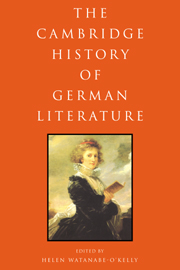Book contents
- Frontmatter
- 1 The Carolingian period and the early Middle Ages (750–1100)
- 2 The high and later Middle Ages (1100–1450)
- 3 The early modern period (1450–1720)
- 4 The German Enlightenment (1720–1790)
- 5 Aesthetic humanism (1790–1830)
- 6 Revolution, resignation, realism (1830–1890)
- 7 From Naturalism to National Socialism (1890–1945)
- 8 The literature of the German Democratic Republic (1945–1990)
- 9 German writing in the West (1945–1990)
- Select bibliography
- Index
- References
4 - The German Enlightenment (1720–1790)
Published online by Cambridge University Press: 28 March 2008
- Frontmatter
- 1 The Carolingian period and the early Middle Ages (750–1100)
- 2 The high and later Middle Ages (1100–1450)
- 3 The early modern period (1450–1720)
- 4 The German Enlightenment (1720–1790)
- 5 Aesthetic humanism (1790–1830)
- 6 Revolution, resignation, realism (1830–1890)
- 7 From Naturalism to National Socialism (1890–1945)
- 8 The literature of the German Democratic Republic (1945–1990)
- 9 German writing in the West (1945–1990)
- Select bibliography
- Index
- References
Summary
Introduction
Developments in literary historiography, especially in the last few decades, have called into question facile analyses, convenient categorisations, and underlying assumptions about the possibility of determining ‘real’ history. With the growing number of challenges to the belief that we in the present can establish a set of distinct truths about the past – with the doubt (propounded above all by postmodernists) about the possibility of a unified (clearly identified and defined, absolutely understood) self – and with the concomitant awareness (offered most recently by feminist scholars) that however much we can glean about the past, the usual sample that we have chosen has been narrow and limited, the writing and study of literary history have become more complex. Learning about history can no longer involve only the investigation of privileged individuals who have often been assumed to represent universally applicable characteristics and ideologies. We know that we need to broaden our study, to re-focus the lens, to think contextually.
We also know that the task of writing and thinking about history is one that cannot be marked by universalising statements. What we must acknowledge is the necessity on the part of (literary, but also other) historians for approximations and attempted assumptions. Given that every idea, every concept, even every category understood to represent some solid, dependable, credible, perhaps even absolute thing is now seen as socially constructed, as temporary, uncertain, and changeable, the most a literary historian can hope for is to provide an estimate of a time and place that she/he cannot ever fully know.
- Type
- Chapter
- Information
- The Cambridge History of German Literature , pp. 147 - 201Publisher: Cambridge University PressPrint publication year: 1997
References
- 1
- Cited by



